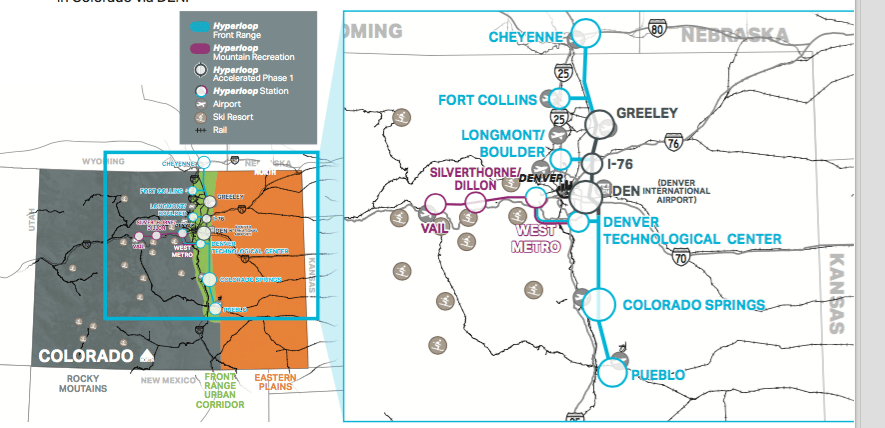
The announcement that Colorado officials were working with a tech company on the possibility of an unproven transit network raised eyebrows and excitement earlier this month. Now we know more about the proposal they're working on, including potential price tags and timing.
To get you caught up, Colorado's Front Range has been named as one of 10 "finalists" that Hyperloop One is considering for construction of a transit network that sends pods hurtling through vacuum tubes, an idea popularized by Elon Musk.
There is no such transit system in the world, and there's no guarantee that Hyperloop One can pull it off. The company says its has built a full-size test facility, but it's less than a mile long.
However, Colorado's state and local governments have moved quickly on the possibility, including a commitment to spend $500,000 to $1 million on a study of possible Front Range routes in collaboration with Hyperloop One.
Meanwhile, the Colorado Department of Transportation has already produced a detailed (and rather pretty) report on the "Rocky Mountain Hyperloop," in collaboration with the city of Denver, Denver International Airport, the city of Greeley, and the engineering giant AECOM.
We'll attach the report below, but here's the rundown of their initial proposal, which of course is subject to plenty of change if this ever becomes reality.
The first phase would connect Denver, the airport and Greeley, which is about 60 miles north. The partners claim that this initial plan could be built for $3 billion and include three stops. If it's true -- and they don't go deep into their math -- then it would be comparable to the RTD project that built the A, G and B rail lines in Denver.
They estimate that this first phase could attract "5 million trips in 2020, and more than 10 million trips in 2040," compared to about 100 million trips per year for the entire RTD system.
The first phase would be relatively cheap compared to other infrastructure projects because it runs in large part through rural and flat terrain, per the report. If it really happened, it would presumably open up wide swaths of the plains for development.
It's also possible that they could start even smaller. Plans for the upcoming feasibility study suggest that the partners will examine a 10-mile "initial phase." The cost of that shorter route is not detailed in the proposal documents.
The second phase would focus on opening up the mountain recreation areas, running 75 miles west to Vail. This initial proposal also shows extensions to Boulder, Cheyenne, Colorado Springs and Pueblo, for a total of 12 stations and 360 miles at a predicted cost of $21 billion.
The overall pitch is that such a network would make the Front Range more economically competitive, more socially connected and generally more enjoyable.
"It will change the way that people move throughout the region, allowing the Front Range’s workforce to live where they want while easily accessing its many specialized, knowledge-driven clusters of economic activity," the report states.
And the greatest benefits, according to the report, would be for the international airport.
"The largest single beneficiary of the Rocky Mountain Hyperloop will be DEN. In establishing the hub of the Hyperloop network near DEN, the timeline for the full development capacity of Aerotropolis will be accelerated by decades," the proposal states, referring to plans to build up residential and business areas around the airport.
Colorado, of course, does not have billions of dollars waiting around for this project. The report suggests that the Hyperloop, like the recent rail projects, could take the form of a public-private partnership.
Hyperloop One also is looking at three other U.S. routes, two in India, one in Mexico and one in Canada. The company has raised a total of $245 million since its founding in 2014 and is valued at $700 million, according to Recode.
The company also has competition from Elon Musk himself and other companies interested in the technology. It also has worked on similar studies to the Colorado project in other countries and elsewhere in the United States, as The Verge reported.
You can see the report for yourself here.












